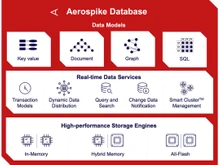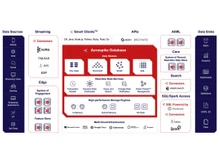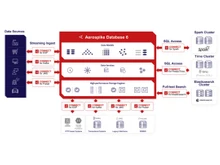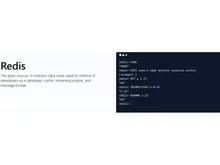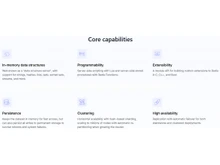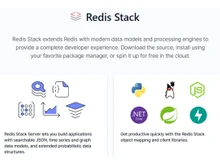Choosing a data storage solution for yourself can be a bit hectic. This includes considering multiple factors and comparing them against the best solutions to make a final decision. There are multiple solutions available in the market with different characteristics.
Aerospike offers strong consistency and advanced data modeling, while Redis excels in its diverse data type support and use cases. Let’s see their comparison further in terms of performance, data model, Server OS, and other features.
Aerospike vs. Redis: An Overview
Aerospike is a leading NoSQL database known for its exceptional low-latency and high-throughput performance. It offers strong consistency and automatic scaling, making it ideal for real-time data processing. Moreover, it also supports disk storage and multi-type data handling.
Redis, on the other hand, is a widely used open-source, in-memory data store known for its high-speed caching and diverse data type support, including strings, lists, sets, and hashes. It is commonly used for real-time analytics, message brokering, and caching. Moreover, Redis provides scalability through sharding and optional disk persistence for data storage and retrieval.
Aerospike vs. Redis: Key Differences
Some key differences between Aerospike and Redis include:
- Aerospike is commonly used as a high-performance, distributed NoSQL database for real-time application data, while Redis is often utilized for caching, session management, messaging, and more.
- Redis supports replication but requires external partition handling for high availability. On the other hand, Aerospike uses a shared-nothing cluster architecture with built-in strong consistency.
- Aerospike and a few other Aerospike alternatives offer a flexible key-value data model with support for secondary indexes, while Redis provides a variety of data structures such as strings, lists, sets, and hashes.
- Redis and other Redis alternatives scale using a master-slave replication model and clustering while Aerospike provides automatic sharding and scaling.
- Aerospike is known for its low-latency, high-throughput performance, especially for read and write operations, while Redis excels in high-speed data caching and processing.
Aerospike and Redis: In Terms of Features
Here's a detailed comparison of Aerospike and Redis based on their feature differentiation:
- Data Model: Redis is a key-value store where each value can be a string, a hash, a list, a set, or a sorted set. It also offers support for geospatial data and streams and flexibility in data modeling., Aerospike supports multiple data types including integers, strings, lists, maps, and byte arrays. It also has native support for complex data types like lists and maps.
- Data Persistence: Redis offers both in-memory and persistent storage options. It saves data to disk through snapshots or a journaling file. Aerospike provides a hybrid memory architecture that uses both memory and SSD storage for persistence. It also supports replication and clustering for high availability.
- Replication: Redis supports asynchronous replication and has consistency by default. It offers master-slave and clustering for replication and high availability. Aerospike provides strong consistency by default and its replication strategy ensures that all replicated copies are consistent.
- Scalability: Both Aerospike and Redis support horizontal scalability. Redis supports scalability through sharding which allows data to be distributed across multiple nodes. Aerospike is designed for automatic and seamless scaling with built-in support for automatic partitioning. This allows users to add more nodes to the cluster to handle the increasing data and load.
- Querying and Indexing: Redis does not provide full-text search or complex querying capabilities but supports indexing and sorting of data structures. Aerospike provides secondary indexes, queries against those indexes, and aggregation functions to query and analyze data.
- ACID Transactions: Redis does not have native support for ACID transactions but offers support for multi-key operations through Lua scripting. Whereas Aerospike supports ACID transactions for single-record operations as well as multi-record operations within a single partition.
Aerospike and Redis: Type & Server OS
Aerospike is a NoSQL, key-value store database. Redis, on the other hand, is an in-memory data store that can function as a NoSQL key-value store, document store, cache, or message broker. Apart from that, in the case of Server OS, both Aerospike and Redis are compatible with various Linux distributions, as well as Windows and macOS.
Aerospike or Redis: Reliability
Aerospike is known for its reliability and fault tolerance, with features such as strong consistency and cross-data center replication (XDR) for data reliability and disaster recovery. Redis provides features for data persistence, replication, and clustering to ensure reliability and fault tolerance.
Aerospike or Redis: Use Cases
Redis is commonly used for caching, real-time analytics, session storage, message brokering, and job queue management. Aerospike, on the other hand, is often used for real-time bidding, fraud detection, user profile stores, and personalized recommendation systems.
Aerospike and Redis: Trigger Method
Aerospike supports various client APIs and triggers for custom application logic and integrations. It also provides built-in mechanisms for replication and failover. Redis supports replication and has support for pub/sub messaging but sometimes requires third-party solutions or custom development for complex trigger-based functionality.
Aerospike or Redis: Performance
Redis is known for its high performance, especially for read-heavy workloads, due to its in-memory architecture and single-threaded nature. Aerospike is optimized for both read and write performance due to its shared-nothing architecture and multi-threaded design.
Aerospike vs. Redis: Replication and High Availability
Redis uses asynchronous replication and offers master-slave replication and clustering for achieving high availability. Aerospike provides strong consistency by default and supports replication with an optimized strategy to ensure high availability.
Aerospike or Redis: Consistency Model
Redis defaults to eventual consistency, which means that there can be a delay in propagating updates across the system. Aerospike provides strong consistency by default, ensuring that all replicated copies are consistent in real time.
Aerospike and Redis: Geo-Distributed Operations
Aerospike offers features designed for geo-distributed operations, including the capability to maintain data consistency across multiple geographic regions. Redis lacks built-in support for geo-distributed operations and requires additional architectural considerations for such scenarios.
Aerospike and Redis: Data Eviction and Expiration
Redis provides configurable data eviction and expiration policies to manage memory usage and data retention. Aerospike's hybrid memory architecture and built-in data retention policies allow for efficient management of data eviction and expiration.
Aerospike or Redis: Full-Text Search and Complex Querying
Aerospike supports secondary indexes and provides powerful querying and aggregation capabilities for complex data analysis. Redis, while versatile in its data structures, does not provide native support for full-text search or complex querying.
Aerospike vs. Redis: Pricing and Licensing
Redis offers both open-source and commercial licensing options, with different feature sets and support offerings. Aerospike also has open-source and enterprise editions, with varying capabilities and support based on the chosen edition.
Verdict: Aerospike vs. Redis
In short, Aerospike and Redis differ in data persistence, use cases, replication strategies, data models, scaling mechanisms, and performance characteristics. Aerospike offers durable disk storage and strong consistency for real-time application data. On the other hand, Redis is mainly used for caching and messaging with optional disk persistence and a variety of data structures. Aerospike's automatic sharding and low-latency performance stand out compared to Redis' master-slave replication and high-speed caching capabilities.


 6 Ratings & 0 Reviews
6 Ratings & 0 Reviews


